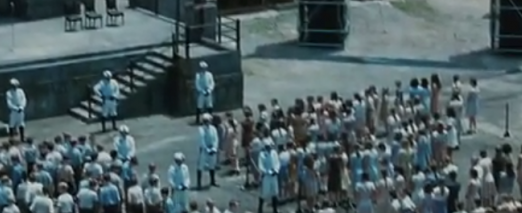As embarrassing as it is for me to admit this – especially in such a public forum – when “Twilight” was first released in 2005, I fell in love with the story. While it represented the antithesis of feminism, of individuality, of real-life, I too wanted a handsome, charming vampire to come along, sweep me off my feet, protect me from all evil and resist turning me into dinner, regardless of how delicious I smelled to him. I was a teenage girl, and teenage girls love romance, they love chivalry, they love the idea of being in love.
For a couple of years, I devoured any supernatural-romance novels I could get my hands on, until 2008 and the release of Suzanne Collins’ soon-to-be-bestseller, “The Hunger Games”. I dove headfirst into the brutal nation of Panem (the future ruins of the U.S.), where each year, the central government sacrifices the lives of 23 children in the name of entertainment. Though I knew it certainly wasn’t real, there was something about it that struck a chord with me – because, really, it wasn’t so far off of a possible future for humanity. After all, for decades, people have been prepared to sacrifice their dignity and self-respect in the name of reality television; how long before they are prepared to sacrifice their lives?
It was there that my obsession with dystopic fiction developed – at first, I turned to classics like “The Running Man”, “Gattaca”, “The Handmaid’s Tale” and “Minority Report”, and then to newly-developed films and television shows “Terra Nova”, “Gamer”, “Tomorrow, When The War Began” as well as novels such as Ally Condie’s “Matched”, and Veronica Roth’s “Divergent”. I lost myself in these often-disturbing imaginings of humanity’s future, especially as they all seemed so plausible. Is it so hard to believe that society will one day turn death-row prisoners into video game avatars, or use any and all available data on each individual to determine who they will marry, where they will live and what job they will have? On the contrary, all of these worlds seem like frighteningly real possibilities.
With countless novels depicting dystopian worlds on dozens of bestseller lists and Gary Ross’ film adaptation of “The Hunger Games” about to explode into cinemas, it seems that like their ink-and-paper counterparts, dystopic films will soon overtake paranormal romances in the popularity stakes. The real question however, is why?
Dystopic films and novels, though almost always disturbing in nature, have a wonderfully harrowing way of drawing the reader into the grim depths of humanity’s future. Whether it is a corrupt central government that has complete control over its citizens (like in “RoboCop”, “The Fifth Element”, “Aliens” or “Rollerball”), or reality-television gone too far, everything seems almost real, but not quite, which creates a truly captivating effect of a world that might be, but surely isn’t.
The second thing – and this is perhaps the most important – are the characters that inhabit these worlds. They are far more real than the likes of Edward Cullen and Isabella Swan; they are often imperfect, are psychologically damaged by their situation but are prepared to fight for freedom, their beliefs, or love, or a combination of thereof. In amongst the mire of their personal issues, they are usually decent people out to achieve what can be a relatively small outcome.
Take Katniss Everdeen, protagonist and star of “The Hunger Games”, who is often described in the film and novels as moody, sullen, hostile, aggressive, antisocial and angry; all of which apply to her in varying degrees. However, she also volunteered to take her sister’s place in the 74th Annual Hunger Games even though it would mean almost certain death for her, and was determined to get herself and fellow Hunger Games tribute Peeta Mellark out of the arena alive. At the end of the series, though the majority of her goals are achieved, she is left far more damaged than she was when the trilogy started.
Or, perhaps consider Ethan Hawke’s performance as Vincent Freeman/Eugene Morrow in “Gattaca” (1997). He illegally buys the identity of Eugene Morrow (Jude Law) and deceives everyone around him, but only in order to achieve his life dream of becoming an astronaut, something his imperfect “Invalid” genetic code and the perfectionist central government says he can never be.
Compare these to the stars of “Twilight” and the discrepancies are almost embarrassing. Bella is whiny, selfish and obsessed with her bloodsucking boyfriend; Edward is embarrassingly overprotective, controlling and stalker-ish. When their saga is over, they get everything they want –marriage, wealth, a baby, to be vampires and together forever – with very little sense of loss or consequence. It’s embarrassing, really, to adore such characters when really, they have done nothing to deserve our admiration or even interest.
There’s plenty of interesting people to invest in in the many dystopian films out there; take Rick Deckard, the closet replicant at the center of Ridley Scott’s “Blade Runner”, Clive Owen’s pregnant-mama-saving good-guy from “Children of Men” (2009), the legendary Ellen Ripley and her marine pals in “Aliens” (1986), Snake Plissken in the beloved science-fiction masterpiece “Escape from New York” (1981) and, of course, Officer Alex Murphy from the “RoboCop” saga (1987-1993) – who, complete with salvaged parts, had to work the beat in a government controlled dystopic society that turn even the sanest person mad.
Will cinema’s incarnation of Katniss and company join that list? I’d bet on it.
To prepare for the highly-anticipated “Hunger Games”, let’s take a look at some of the best cinematic dystopia’s you MUST visit :
“Blade Runner” (1982)
“RoboCop” (1987)
“Total Recall” (1990)
“Aliens” (1986)
“Minority Report” (2002)
“Serenity” (2005)
“The Terminator” (1984)
“Escape from New York” (1981)
“Tomorrow When The War Began” (2010)









